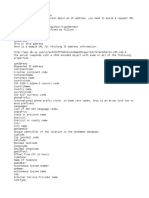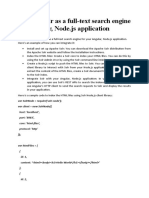0% found this document useful (0 votes)
218 views1 pageDynamically Add Host or IP in Env File
The document describes how to dynamically add a hostname or IP address to an Angular environment file by using a variable instead of a hardcoded value. It involves creating an env.js file to export a SERVER_HOST variable, importing that variable into the environment file and replacing hardcoded addresses with it, and setting the variable before building to the desired host. This allows easily switching servers without manually updating the environment file each time.
Uploaded by
GhaziAnwarCopyright
© © All Rights Reserved
We take content rights seriously. If you suspect this is your content, claim it here.
Available Formats
Download as DOCX, PDF, TXT or read online on Scribd
0% found this document useful (0 votes)
218 views1 pageDynamically Add Host or IP in Env File
The document describes how to dynamically add a hostname or IP address to an Angular environment file by using a variable instead of a hardcoded value. It involves creating an env.js file to export a SERVER_HOST variable, importing that variable into the environment file and replacing hardcoded addresses with it, and setting the variable before building to the desired host. This allows easily switching servers without manually updating the environment file each time.
Uploaded by
GhaziAnwarCopyright
© © All Rights Reserved
We take content rights seriously. If you suspect this is your content, claim it here.
Available Formats
Download as DOCX, PDF, TXT or read online on Scribd
/ 1































































